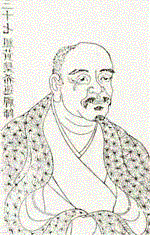A Quote by Huangbo Xiyun
The nature of the Absolute is neither perceptible nor imperceptible; and with phenomena it is just the same. But to one who has discovered his real nature, how can there be anywhere or anything separate from it?... ...Therefore it is said: 'The perception of a phenomenon IS the perception of the Universal Nature, since phenomena and Mind are one and the same.'
Related Quotes
Perception without the word, which is without thought, is one of the strangest phenomena. Then the perception is much more acute, not only with the brain, but also with all the senses. Such perception is not the fragmentary perception of the intellect nor the affair of the emotions. It can be called a total perception, and it is part of meditation.
When a man in the process of dreaming becomes conscious that he is dreaming, he is no longer identified with the phenomena; he is not affected exultantly or dolefully. God consciously dreams His cosmic play and is unaffected by it's dualities. A yogi who perceives his real self as separate from his active senses and their objects never becomes attached to anything. He is aware of the dream nature of the universe and watches it without being entangled in its complex but ephemeral nature.
Nothing comes to pass in nature, which can be set down to a flaw therein; for nature is always the same, and everywhere one and the same in her efficacy and power of action: that is, nature's laws and ordinances, whereby all things come to pass and change from one form to another, are everywhere and always the same; so that there should be one and the same method of understanding the nature of all things whatsoever, namely, through nature's universal laws and rules.
For us, mind has nature for its premise, being nature's truth and for that reason its absolute prius. In this truth nature has vanished, and mind has resulted as the idea arrived at being-for-itself, the object of which, as well as the subject, is the concept. This identity is absolute negativity, for whereas in nature the concept has its perfect external objectivity, this its alienation has been superseded, and in this alienation the concept has become identical with itself. But it is this identity therefore, only in being a return out of nature.
While [Plato] affirmed with emphasis that the place of the individual in society should not be determined by birth or wealth or any conventional status, but by his own nature as discovered in the process of education, he had no perception of the uniqueness of individuals. For him they fall by nature into classes, and into a very small number of classes at that.
The essences of the Gods never came into existence (for that which always is never comes into existence; and that exists for ever which possesses primary force and by nature suffers nothing): neither do they consist of bodies; for even in bodies the powers are incorporeal. Neither are they contained by space; for that is a property of bodies. Neither are they separate from the first cause nor from one another, just as thoughts are not separate from mind nor acts of knowledge from the soul.
Minds that are stupid and incapable of science are in the order of nature to be regarded as monsters and other extraordinary phenomena; minds of this sort are rare. Hence I conclude that there are great resources to be found in children, which are suffered to vanish with their years. It is evident, therefore, that it is not of nature, but of our own negligence, we ought to complain.
What, indeed, is an atheist? He is one who destroys delusions which are harmful to humanity in order to lead men back to nature, to reality, to reason. He is a thinker who, having reflected on the nature of matter, its energy, properties and ways of acting, has no need of idealized powers or imaginary intelligences to explain the phenomena of the universe and the operations of nature.
In my judgment, the Deists were all successfully answered. The god of nature is certainly as bad as the God of the Old Testament. It is only when we discard the idea of a deity, the idea of cruelty or goodness in nature, that we are able ever to bear with patience the ills of life. I feel that I am neither a favorite nor a victim. Nature neither loves nor hates me.






























